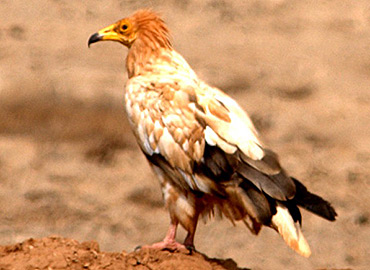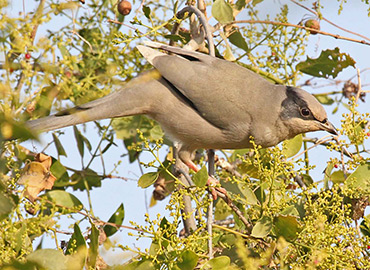|
18/02/2020
Co-hosted MBI Al Jaber Foundation Lecture: “The Birds of the Arabian Peninsula” by Rob Sheldon
The MBI Al Jaber Foundation was recently invited to co-host a lecture with its partner institution, the International Association for the Study of Arabia (IASA). The lecture, ‘Birds of the Arabian Peninsula’, was presented by Rob Sheldon, a freelance conservationist who has worked in the field for almost 20 years, including 12 years with the Royal Society for the Protection of Birds (RSPB). Most recently, Rob has worked as the director of the King Khalid Wildlife Research Centre in Saudi Arabia and has been a council member of the Ornithological Society of the Middle East, the Caucasus and Central Asia (OSME) since 2009, currently acting as Chair.
 |
 |
| Egyptian Vulture; credit Rob Sheldon |
Hypocolius; credit Richard Porter |
Rob introduced the lecture, which focussed on the varied bird life of the Arabian Peninsula, by presenting OSME, founded in 1968 as the Ornithological Society of Turkey, which then expanded to cover a much wider territory over the years. The regions covered by OSME provide conservationists with a wide range of avian species to observe and study. OSME is also committed to raising the interest of young people from the Middle East in the preservation of endangered wildlife.
Rob discussed how the region isn’t just desert, but has a wide-range of habitats that attract many different bird species; the mountains, the Red Sea coast, the Farasan Islands, as well as the Oman-Gulf shores are the most biodiverse habitats of the region. Rob then highlighted the flyways that many species follow during their migrations in spring and autumn, with many passing through the Arabian Peninsula, and some birds spending the winter there. Indeed, the proliferation of irrigated areas, gardens and artificial wetlands in the Middle East, and the Arabian Peninsula in particular, have proved attractive to some birds, with a number of species actually choosing to make those areas their new dwelling spaces. These new habitats started to appear during the 1980s and are now well established. Over the years, the UAE, Saudi Arabia, Oman, Kuwait, Qatar and Bahrain have seen an increase of artificial habitats which started to host songbirds and other small-sized species that are not native to the Arabian Peninsula. Most of these species have adapted very well, as Rob pointed out.
Rob also discussed a number of issues concerning the mountainous areas of Saudi Arabia and Yemen. These areas can be well vegetated and habitats such as Juniper scrub can be especially important for birds. The Asir mountains are especially important for many of the endemic birds of the Arabian Peninsula and habitat degradation can be a problem for these species which are found nowhere else on earth. He further stressed how the grazing of livestock in mountainous and desert habitats can reduce the amount of vegetation for other species and limit both food and nesting opportunities.
One of the very recent and great achievements of OSME is the creation the first Arabic guidebook to birds of the MENA region, a tool that had been available only in European languages. The guide is also available as a free to download smartphone app.
Android version: click here
Apple version: click here
OSME have a regular publication entitled ‘Sandgrouse’ that contains papers and short notes on ornithology, conservation news and a comprehensive round-up of bird sightings in the OSME region.
For further information, please contact:
Director Public Relations
[email protected] |



